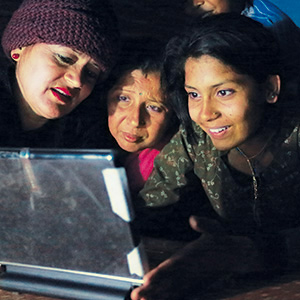

Access Pack
Doug McNeil, Salem’s co-founder of Lighting for Literacy, says that technology “absolutely” plays a critical role in “speed[ing] up that process” of solving social issues, both abroad and at home. McNeil, an engineer who has worked in the aerospace industry for more than three decades, immediately realized that Salem’s solar-powered lights could be used not just to help students in Colonet, Mexico, but also in Silicon Valley, so he convinced Salem to let local middle schoolers construct the charge controllers for the units.
Youth at their church put together the first batch of lights, and since then they have brought in more than 300 students across several local schools to build the solar units. “It has been said both within the state education system and nationally that the United States needs to do more to focus on STEM,” Salem says of the fields of science, technology, engineering and math. “So we decided that needed to be a strong component of Lighting for Literacy. The idea is to educate children on both sides of the border.
“That’s the essence of what we do in Silicon Valley—we generate ideas and have a lot of energy and passion toward creating new technology,” adds McNeil. “If we want to make the United States even more productive, we have to reach back and help the next generation.”
Jen Padgett, CEO of the Community Technology Alliance in San Jose, relies on a similar model of adapting existing technology and engaging youth at home to create products for those abroad with her innovation, the BeaconPack.
Originally named the STEM Sherpa, the BeaconPack is a small, black backpack with a solar panel mounted on the outside and some basic computer parts inside. The idea is aimed at bridging the digital divide by providing access to several pre-loaded websites, educational tools and a mini-mesh network in rural areas that currently have no Internet access. “For some, it’ll be four or five years until they have Internet, so the BeaconPack is preparing them,” says Padgett, “so they can hit the ground running.”
The key component is something called a Raspberry Pi. “It’s basically a credit card-sized computer—all the content will go on one of these,” she explains. “It requires minimal power. There’s a 64-gig SD card, and it has a video and an audio card. You could just about program an Xbox to run on one of these—that’s how powerful they are.” But unlike a regular computer, the Raspberry Pi has no screen—so users have to plug in their own devices, whether a smartphone or a television, to view content.
In addition, the pack includes an antenna that creates a mobile hotspot with a half-mile range. “A lot of people have cell phones, and they might go to the main town to use them, but they don’t have coverage when they come back, so they can hook in through there,” says Padgett. “They’d be able to communicate via text message, check weather information and chat within their community. It’d act as a mini cell phone tower within the community.”
BeaconPack was conceived 30,000 feet off the ground on a British Airways flight from San Francisco to London that doubled as a brainstorming session for 100 innovators to come up with solutions to social and technological problems in the developing world. Padgett came up with the idea for BeaconPack and pitched the idea to the DNA—Decide Now Act—Summit in London and at the G8 Innovation Conference last year.
For now, the BeaconPack project runs on donations, but Padgett says she hopes it can eventually move to a model similar to that of Toms Shoes, in which the packs will be sold to backpackers and hikers, and for every unit sold, one will also be donated to those in need.
BeaconPack is currently in the development stage, with students at Santa Clara University’s Frugal Innovation Lab working on coding the Raspberry Pis with static, stand-alone pages such as Wikipedia and regional interest topics—”perhaps farming information,” says Padgett. Once the products are completed, Padgett has a pilot site identified in Ghana that will receive the first batch of BeaconPacks.



